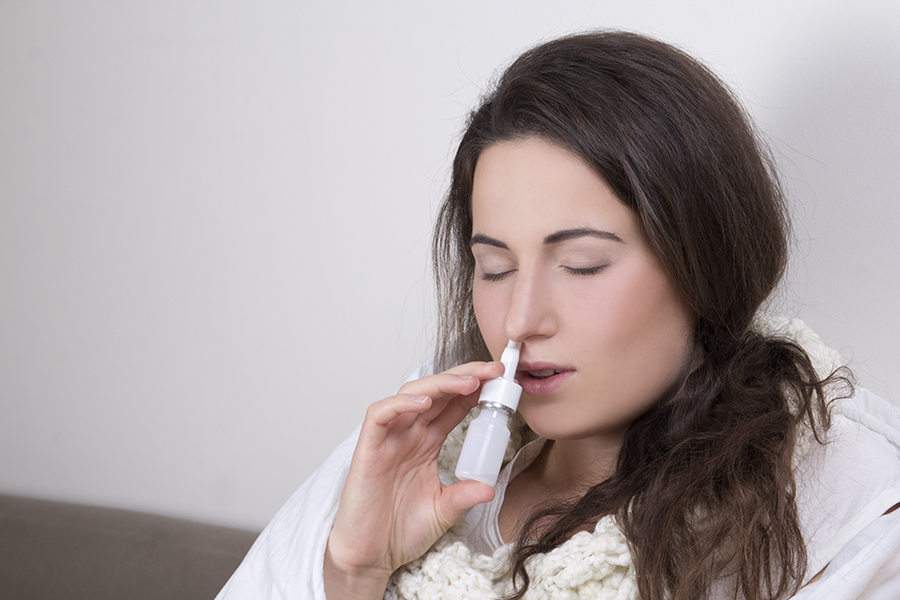Oxytocin Nasal Sprays May Treat Mental Illness

(This content is being used for illustrative purposes only; any person depicted in the content is a model)
If you ever had a stuffy nose, you might have used nasal sprays to help you decongest.
Now, there is a product being tested for mental illness that delivers treatments through the nose.
Researchers at the University of Oslo in Norway have tested a new device for delivering hormone treatments for mental illness.
The treatment would deliver Oxytocin, a hormone that has shown promise for treating mental illnesses, through the use of nasal sprays. Since oxytocin is a large molecule, it is difficult to get the hormone to the brain, therefore researchers have collaborated with the company OptiNose to develop a nasal spray to deliver the oxytocin to patients.
Research is needed to understand how oxytocin reaches and affects the brain. The collaboration with OptiNose will allow researchers to better understand how oxytocin affect the way social signals are perceived.
In the study, sixteen healthy men received two different doses of oxytocin, along with placebo. Volunteers were also given intravenous doses of oxytocin, for a comparison of the effects of oxytocin in circulating blood.
The research showed that only those administered a low dose of oxytocin experienced an effect on how they perceived social signals. The study also discovered that individuals with larger nasal cavities had a stronger response to a low dose of oxytocin.
The study observed that the men who were given oxytocin intravenously felt no effect. This shows that oxytocin is most effective when delivered straight to the brain like through a nasal spray.
Oxytocin is responsible for enhancing a person’s sense of:
- Optimism
- Trust
- Mastery
- Self-esteem
There are many life situations where the body stops producing healthy levels of oxytocin:
- Post-Traumatic Stress Disorder (PTSD)
Those suffering from PTSD are in a constant state of anxiety and fear. Research shows that oxytocin can reduce background anxiety in PTSD sufferers. - Childhood Trauma
Trauma during infancy can affect oxytocin levels into adulthood. The kind of trauma can range from severe abuse to divorce. When a child deals with trauma, the mind develops a defense mechanism that reduces levels of oxytocin. It is a survival mechanism but unfortunately it can affect overall physical health. - Autism Spectrum Disorder (ASD)
The receptor site for oxytocin is not genetically available for people with autism. If oxytocin has nowhere to go, it cannot do its job. In those with autism, the production of oxytocin is drastically. - Schizophrenia
People with schizophrenia have difficulty deciphering social cues from those around them. They find it difficult to recognize emotions, have empathy, and are impaired in a wide range of social cognitive abilities. Oxytocin could aid in increasing social perception. - Bipolar Disorder
People with bipolar disorder have imbalanced mood state which deeply affects their energy levels, attitude, behaviors, and ability to function in society. Low doses could be used to help level mood behaviors.
The next step in the research is to conduct tests on people with mental illnesses. Hopefully, this new way of administrating oxytocin could be beneficial for people who need it most.
“We hope that this research project is the first step in the development of a series of new medicines that may be of great help to more people with mental illness,” concluded University of Oslo Professor Andreessen in the trial.
OptiNose will be different from traditional nasal sprays because it will be constructed in a way to deliver the medicine high up into a patient’s nasal cavity. This enables the brain to deliver the hormone into the nerve pathways. Since less medicine is lost along the way, patients can take smaller doses and experience fewer side effects.
More research is planned to determine the effectiveness of the hormone. The hope is that it can provide some relief to patients suffering from mental illnesses. If you think you might be struggling with a mental illness, please see a professional to discuss your condition. If you or someone you love is struggling with substance abuse or addiction, please call toll-free 1-800-777-9588.
